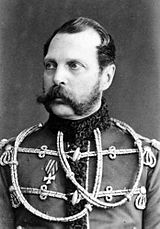- Name of Russia (Russia TV)
-
For the name of the country, see Russia (name).
Name of Russia (Russian: Имя России, literally "Name Russia") is the project of the Russia TV channel aimed to elect the most notable personality in Russian history by voting via the Internet, radio and television. The program is similar to British 100 Greatest Britons and other such projects held in different countries.
Contents
History of the project
The Russia TV Channel initially nominated 500 names who "played significant role in Russia's history", selected by the Institute of Russian History of the Russian Academy of Sciences.[1] On 12 June 2008 the list was shortened to 50 by voting.[2] In December 2008 the name of the winner was announced. First was Alexander Nevsky, second was Pyotr Stolypin and third was Joseph Stalin.[3]
Controversy
From the very beginning the project received heavy criticism for a number of reasons. The information pages presented at the project’s site and linked to every personality (named dossier pages by project creators) were named inaccurate and laden with trivial and inconsistent details. Internet news agency http://lenta.ru/ revealed and explained some bloopers found on aforesaid pages.
Furthermore, the nature of the free voting also resulted in a certain controversy. According to the rules the election is based on approval voting where any Internet user can vote for a number of different candidates. In addition, any user can vote for any candidate as many times as he/she wants. With that method the whole system proved to be very unpredictable. Since flash mobs were allowed and no protection set against automatic bots which were clicking the button for extended period of time, the results were changing at sheer speed. Some candidates received thousands of votes in days and suddenly rose from the bottom of the list to its top. Some bloggers also pointed out that management of the project is prejudiced against certain candidates, namely the controversial Soviet-era figures Joseph Stalin and Vladimir Lenin. The amateur site created to collect voting information from project and monitor results as graphs demonstrated that Stalin and Lenin voting score were held back, while others candidates were receiving votes in a regular way. See Unnamed Russia.
Frustrated by results of the voting, Internet users also created alternative sites with a similar goal, but fair, as they view it, system of vote counting. See Names of Russia for example, or reversed amateur project where users are offered to choose the antihero of Russian history within the same array of possible candidates as initially in Name of Russia project.
New rules
On 14 August, the new voting rules for the project were introduced. The system of voting remained the same, but before giving a vote a user should pass a challenge-response authentication in form of a multiple-choice question with four possible options and only one right answer. According to the project's management this new measure is aimed to curb the 'war of machines' or computer generated votes.
The 12 greatest Russians were:[1]
Historical person Promoter Air date Alexander II Director of RAS Russian history institute Andrey Sakharov 30 November 2008 Fyodor Dostoyevsky RF Ambassador in NATO Dmitriy Rogozin 9 November 2008 Catherine the Great Governor of Krasnodar Kray Alexander Tkachyov 16 November 2008 Ivan the Terrible Painter Ilya Glazunov 14 December 2008 Vladimir Lenin CPRF leader Gennadiy Zyuganov 23 November 2008 Dmitri Mendeleev professor, vice-president RAES Sergei Kapitsa 26 October 2008 Peter the Great RF ambassador on Ukraine Viktor Chernomyrdin 12 October 2008 Alexander Pushkin pushkinist and Soviet dissident Yuriy Kublanovskiy 17 December 2008 Alexander Nevsky Mitropolit Kirill 5 October 2008 Joseph Stalin general of army Valentin Varennikov 19 October 2008 Pyotr Stolypin film-director Nikita Mikhalkov 21 December 2008 Alexander Suvorov Federation Council of Russia speaker Sergey Mironov 2 November 2008 Results
- St. Alexander Nevsky (1220–1263), the Grand prince of Novgorod and Vladimir
- Pyotr Stolypin (1862–1911), a prime minister of the Russian Empire
- Joseph Stalin (1878–1953), the Soviet premier, Generalissimo of the Soviet Union
- Aleksandr Pushkin (1799–1837), a writer and poet
- Peter I "the Great", (1672–1725), the First Emperor of Russia
- Vladimir Ilyich Lenin (1870–1924), a revolutionary and the founder of the Soviet Union
- Fyodor Dostoyevsky (1821–1881), writer
- Alexander Suvorov (1729–1800), the Russian Imperial Army general
- Dmitri Mendeleev (1834–1907), a chemist and the inventor of the periodic table of elements
- Ivan IV "the Terrible" (1530–1584), a tsar
- Catherine II "the Great" (1729–1796), an empress
- Alexander II (1818–1881), an emperor
References
- ^ Top 500(Russian)
- ^ Top 50 (Russian)
- ^ "Stalin voted third-best Russian". BBC. 28 December 2008. http://news.bbc.co.uk/1/hi/world/europe/7802485.stm.
External links
- Official site of 'Name of Russia' project
- 'Names of Russia' alternative project
- 'Unnamed Russia' project
- Greatest Russian? Czar Nicholas leads vote
Countries' greatest people TV series and media polls Argentina: El Gen Argentino • Belgium: Belg der Belgen/De Grootste Belg / Le plus grand Belge • Bulgaria: Velikite Balgari • Canada: The Greatest Canadian • Catalonia: El Favorit • Chile Grandes Chilenos de Nuestra Historia • Croatia Greatest Croatian • Czech Republic: Největší Čech • Finland: Suuret suomalaiset • France: Le Plus Grand Français • Germany: Unsere Besten • Greece: Great Greeks • Ireland: Ireland's Greatest • Israel: 200 Greatest Israelis • Italy: Il più grande italiano di tutti i tempi • Japan: The Top 100 Historical Persons in Japan • Netherlands: De Grootste Nederlander • New Zealand: New Zealand's Top 100 History Makers • Portugal: Os Grandes Portugueses • Romania: Mari Români • Russia: Imya Rossiya • South Africa: Great South Africans • Spain: El Español de la Historia • Ukraine: Velyki Ukraïntsi • United Kingdom: 100 Greatest Britons • USA: The Greatest American • Wales: 100 Welsh Heroes
Categories:- Russian television programs
- Greatest Nationals
- Lists of people by nationality
- Lists of Russian people
Wikimedia Foundation. 2010.

